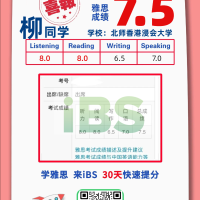Budding Writers | 思考公共知识分子的身份
The Search for Public Intellectuals’ Identity:
Of Tainted Purity
自古以来,我国社会对于知识分子就有“铁肩担道义”的期待。“公共知识分子”本来是褒义词。然而,近年来公共知识分子的社会声誉明显下降,还被打上了“公知”的标签。那么这其中的变故是怎么回事呢?
The disturbing derogation1 of public intellectuals reveals dissatisfaction from the public towards irresponsible intellectuals. Yet, as long as our nation demands development, public intellectuals are indispensable2.
Traditionally, public intellectuals are from the public and into the public. They stand out as the educated, not solely with academic background and professional knowledge, but with public spirit and independent spirit. They sympathize and empathize3 with the public; they pursue democracy and equal rights for the public; they devote heart and soul to the public.
It should be noted, however, that, for public interests, sometimes public intellectuals stand against the public mind. Hanyu, the outstanding scholarin Tang Dynasty, for instance, wrote down the well known article “On Educators” (“Shi Shuo”), appealing for learning from teachers, setting against shared shame for acknowledging others as one’s masters.4
1. derogation: 贬低。
2. indispensable: 必需的,不可或缺的。
3. empathize: 有同感,有共鸣。
4. 比如,唐代杰出学者韩愈曾写下著名的《师说》,抨击当时耻学于师的风气,倡导人们从师学习;set against: 反对。
Status quo stands in stark contrast.5 Seemingly, it is the public that harbour6 hostility towards public intellectuals, but that is not an accuratenotion. Most people are still in favour of public intellectuals in a traditional sense. In reality, however, a swarm of intellectuals scramble for grandstanding.7 What they present are not thought-provoking considerations, but baffling and unfounded cries.8 Consequently, the purity of public intellectuals has been tainted. And it is no wonder that when expressing views over public affairs on the new media, many public intellectuals have been trapped in a dilemma recently: no matter what they say, they will be accused of “grabbing eyeballs” and “spreading rumours”, or even be denounced as “traitors”.9
That is pathetic10. Yet what accounts for this?
First of all, irresponsible intellectuals have to bear a part of
the blame. The key point is that while pleading in the name ofpeople,11they secure personal gain at the expense of public good. To be specific, some intellectuals, belonging to some special interest groups, make profits through deceiving the public. In addition, numerous intellectuals are puffed with conceit12. Without sufficient knowledge or research, they weigh things on their feelings in lieu of13 facts. As a result, plenty of rumours are produced and spreadon the new media. Also, a swathe of them worship and kowtow to everything foreign.14 These intellectuals have lost their national dignity, one of the basic civic15 virtues. That is why they disgust the public.
5. status quo: 现状;stark: 鲜明的。
6. harbor: v. 心怀,怀有。
7.然而,事实是一群知识分子争先恐后地哗众取宠。a swarm of: 一群;scramble: 争夺,争抢;grandstanding: 哗众取宠。
8. 他们呈现的不是发人深省的考量,而是不可理喻、毫无根据的说法;thought-provoking: 发人深省的;baffling: 不可理喻的,令人困惑的;unfounded: 无端的,不依据事实的。
9. dilemma: 两难境地;denounce: 谴责,痛斥。
10. pathetic: 可悲的。
11. plead in the name of people: 打着“为民请命”的旗号。plead意为“请求,申诉”。
12. be puffed with conceit: 自我膨胀的,自负的。
13. in lieu of: 而非。
14. a swathe of: 一大堆;kowtow:极力讨好,卑躬屈膝;worship and kowtow to everything foreign意为“崇洋媚外”。
15. civic: 公民的。
Meanwhile, some netizens and insufficient censorship cannot escape the blame either.16 A host of netizens are sheer charlatans.17 Whereas the new media is a world where information lacks traditional mechanisms of filter, which makes it so easy to become an “intellectual” or “expert”. With fake educational background and forged18 identity, these liars disguise themselves as intellectuals or experts. Taking advantage of this, they make up stories and sell them to the public. Save charlatans, keyboard warriors make their contributions, too.19 These people taste piquancy in evil-speaking and feel self-exaltation in condemning others.20 Full of narrow-mindedness, they morally kidnap and villainize public intellectuals, simply confounding the right with the wrong.21
16. netizen: 网民;censorship: 审查制度。
17. a host of: 许多,一大群;charlatan: 江湖骗子。
18. forged: 伪造的。
19. 除了那些以专家自居的江湖骗子,键盘侠们也难辞其咎;keyboard warrior: 键盘侠,指在现实生活中胆小怕事,在网上却占据道德高点发表“个人正义感”的人群。
20. 这些人喜欢诽谤他人,通过谴责别人来抬高自己;piquancy: 刺激的趣味;evil-speaking: 诽谤,恶语中伤;self-exaltation: 自我欣赏,自鸣得意;condemn: 谴责。
21. 他们思想狭隘,混淆是非,对公共知识分子进行道德绑架和抹黑。kidnap: 绑架;villainize: 使成为反派 ,来自名词villain(反面人物);confound...with...: 使......混淆。
Then how to take this nasty stigma out of intellectuals’ reputation?22 For public intellectuals, elites of our nation,it is necessary, albeit arduous and not always rewarding,23 to take social responsibilities according to our tradition.They should not pander to24 the public; rather, they should enlighten them. Moreover, in such a diverse society, when confronting unfair treatment, they need to stay patient, stick to the truth and strive against25 bias. When it comes to the public, they should learn to hold objective perceptions towards achievements and flaws of public intellectuals. After all, public intellectuals are only human.They are not infallible26. More importantly, the public need to elevate27 the ability to identify the truth by themselves, instead of blindly following others. For them, what is needed is to learn to question validity28 of information from any sources, without privileging one over the other. Also, it is necessary for them not to develop uncritical assumptions and actions as they use the new media. Asidef rom intellectuals and the public, the new media is in need of amelioration29, too. It ought to verify identities of intellectuals and experts.
To conclude, in order to restore public intellectuals’ uniqueness and purity, all parties are expected to do their bits.
22. nasty: 令人不快的;stigma: 污名,烙印。
23. elite: 精英;albeit: 尽管;arduous: 艰巨的,费力的;albeit arduous and not always rewarding指“尽管费力又不一定讨好”。
24. pander to: 迎合,取悦。
25. strive against: 对抗。
26. infallible: 完美无缺的。
27. elevate: 提升。
28. validity: 有效性,正确性。
29. amelioration: 改善。






